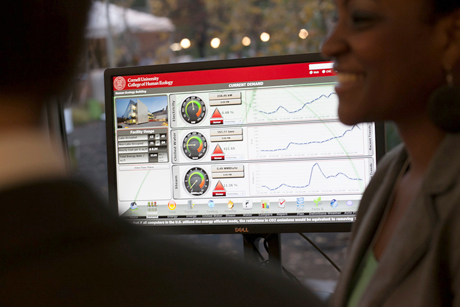Thermostat setbacks over holiday lead to fiscal bonus
By Blaine Friedlander

Over the nine-day winter holiday, the Ithaca campus prevented 1,200 metric tons of carbon dioxide from being pumped into the atmosphere and avoided $140,000 in electricity costs by turning down temperatures and unplugging electric devices, a 7 percent improvement over the 2012 holiday setback program.
As part of the university’s Energy Conservation Initiative, Facilities Services has installed real-time metering to measure electric demand at the Combined Heat and Power Plant, and at substations throughout campus. “We use this data to generate the holiday setback program analysis and final report,” said Erin Moore, Cornell’s energy outreach coordinator. “This has allowed us accurate data and to paint a better picture of energy saving opportunities. We are entering a new era, gathering new information, which helps us summon newfound strength in energy conservation.”
Cornell’s Ithaca campus comprises 14 million square feet of indoor space across 150 buildings. The Cornell community’s joint efforts to conserve make significant, measurable changes in energy usage and consumption, Moore said.
Electricity demand for the 2013 winter break – between Dec. 25, 2013, and Jan. 2, 2014 – was 21,000 kilowatts, for a cost of about $362,000. The typical nine-day campus electricity usage is about 30,000 kilowatts, or $503,000, said Moore. The holiday setback program resulted in a 28 percent reduction in electricity usage.
Since students, faculty and staff generally don’t occupy buildings during the holiday break, Facilities Services set temperatures back to 64 degrees Fahrenheit, the temperature to which campus buildings are set for nights and weekends. The Energy Management group of Facilities Services has installed occupancy sensors that bring spaces back to 68 degrees whenever someone enters a room throughout campus and more modern buildings equipped with advanced controls can be programmed from a remote location.
In addition, Energy Management and the Energy Conservation Controls Team worked with building coordinators, facility managers and building occupants prior to the holiday setback program start to address temperature concerns for research, said Moore.
Said Moore: “The continuous supply of energy data is becoming part of our analysis. We are very excited about the ability to see in each building the effects of either user behavior or programmed control setbacks, and expect to continuously improve with data in the coming years.”
Media Contact
Get Cornell news delivered right to your inbox.
Subscribe